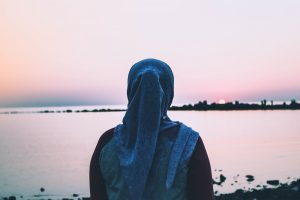
Nila Ahmad, USA
I looked down at the paper before me and, feeling very important, began to write. I was maybe 10 or 11 years old and I was sitting in a brightly lit hall with about a hundred or so fellow members of Lajna Ima’illah, the women’s auxiliary of the Ahmadiyya Muslim Community. We had each been given a sheet of paper and tasked to write a letter to President Clinton to protest the treatment of Bosnian Muslims during the Bosnian War. I don’t remember what I wrote but as a shy child who was always told to speak up, I remember the feeling of pride and importance that I had been asked to contribute to something which was so much larger than myself. And when I think back on this moment, it hits me anew that although I certainly overlooked it and took it for granted, the very establishment of Lajna Ima’illah was to propel Ahmadi women forward to believe that they had the power to change the world.
Lajna Ima’illah was founded by the Second Caliph of the Ahmadiyya Muslim Community, Hazrat Mirza Bashiruddin Mahmud Ahmad (ra) in 1923 with a grand purpose in mind. He believed women were an integral part of the Ahmadiyya Muslim Community and society at large as God had intended. He stated in an address to women,
‘Only our women can counter the female enemies of Islam who attempt to spread suspicion regarding Islam and indoctrinate our children. If we are to create a spirit of sacrifice in children, that too can only be done through our mothers. In addition to their own spiritual and intellectual progress, the future advancement of the Jama‘at [Community] is largely dependent upon the efforts of women.’1
The Second Caliph (ra) wished to organise women so that they could work towards improving themselves while striving to better the society around them.
However, let us travel back to 1922 when Lajna Ima’illah was just a thought, a Divine inspiration and plan. The US had just two years prior ratified the right for women to vote. England had accorded women the right to vote six years earlier but only if they were above the age of 30 and under certain property restrictions. And in India itself, the backdrop to this historic moment, universal suffrage on a national scale would not be instituted until 1947. Therefore, organizing a movement for women to better themselves, to voice their opinions and thoughts was a firecracker against a globally cultural background which was bent on muting women’s vocal participation in the larger society.
It is for this reason that the Second Caliph (ra) stated,
‘In my view, women still lack an awareness of what Islam desires of them. How should they spend their lives to attainAllah’s pleasure and inherit His blessings in the hereafter, as well as in this world?’2
You can hear the urgency in his words, his desire for women to forget how the world viewed them and focus instead on how God Almighty viewed them. In support of God’s plan for the role women would play on the world stage, the Second Caliph (ra) stressed in his initial appeal,
‘It is necessary for women to come together, increase their knowledge, and then impart that knowledge to others.’3
The Western world is generally lauded for leading the charge on women’s rights, albeit after women have had to fight tooth and nail for this right. In the West, women in the 1920’s did enjoy the right to an education, but it was strongly skewed to the domestic arts, teaching, or nursing. In fact, one of the oldest polytechnics in California, Cal Poly outlined its mission statement for women from 1916-17,
‘To the young woman it offers practical training in housekeeping and homemaking; in fact in all phases of Household Arts.’4
In the meantime, over a course of a three-part lecture, the Second Caliph (ra) outlined numerous subjects he believed women should include in their course of study, including but not limited to religious studies, sign language, astronomy, cartography, chemistry, geography, medicine, and so on. He stated to a fledgling Lajna in 1923,
‘I had also mentioned that men are often unaware of which topics are important to women. For this reason, I proposed that a lecture covering a range of topics be presented before women so that they may decide for themselves the issues they wish to delve into.’5
This is the definition of empowerment. To arm women with knowledge so they can stride forth into the world with the confidence of their Divine right and responsibilities. Islam is the only religion to grant women and men equal footing from the very beginning so that women could spend their efforts and resources on doing the actual work which is needed to better this world. As the Fifth Caliph and Worldwide Head of Ahmadiyya Muslim Community, His Holiness, Hazrat Mirza Masroor Ahmad (aba) stated,
‘In short, no matter which field you look at, it was the women who not only caused a revolution but also became the source of bringing about a complete change in the destiny of man.’6
Women can only bring about a revolution when they believe themselves to be revolutionary and the foundation and mission embodied by the Lajna Ima’illah is just that. Women are meant to be heard, they are meant to chase knowledge, and they are meant to change the world around them. When the Lajna Ima’illah asked my 10-year old self with the heavy bangs and big glasses to use her voice, when they have asked all the little girls to help, to take part, they are instilling in us a sense of pride and accomplishment. We take this feeling with us as we grow up into young women, as we enter the Lajna Ima’illah ready to face the world. And with a 100 years behind us, we still have a lot more work to do to leave an everlasting impact on the world.
About the Author: Nila Ahmad lives in the southern United States with her family. Having graduated with an art degree, she has participated in the illustration of children’s books, as well as serving on the team for US magazine Al-Hilal. Her particular interest is in dispelling misconceptions around women’s status in Islam. Nila is an assistant Editor of the Women’s Section of The Review of Religions.
ENDNOTES
- Ahmad, Hazrat Mirza Bashirrudin Mahmood Ahmad. Orhni Waliyon ke liye Phool. Qadian, Fazl-e-Umar Press, 2008.
- Ahmad, Hazrat Mirza Bashirrudin Mahmood Ahmad. Orhni Waliyon ke liye Phool. Qadian, Fazl-e-Umar Press, 2008.
- Ahmad, Hazrat Mirza Bashirrudin Mahmood Ahmad. Orhni Waliyon ke liye Phool. Qadian, Fazl-e-Umar Press, 2008.
- Williams, Charlie. “Disparity or Equality: How Were Female Students Treated.” https://digitalcommons.calpoly.edu/cgi/viewcontent.cgi?article=1129&context=forumCal Poly.
- Ahmad, Hazrat Mirza Bashirrudin Mahmood Ahmad, Orhni Waliyon ke liye Phool. Qadian, Fazl-e-Umar Press, 2008.
- Ahmad, Hazrat Mirza Masroor Ahmad. “The Significance of Sacrifice in Your Pledge.” June 21, 2008. https://www.alislam.org/articles/significance-sacrifice-your-pledge/




Add Comment